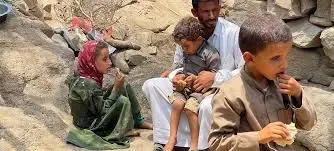Is Nearly Five Million People in Yemen Facing Hunger?

Synopsis
Key Takeaways
- 5 million people at risk of food insecurity in Yemen.
- Urgent humanitarian assistance is needed to prevent further deterioration.
- Factors driving the crisis include economic decline and conflict.
- Yemen's currency has significantly depreciated, affecting purchasing power.
- The conflict has led to the world's worst humanitarian crisis.
Aden, June 23 (NationPress) Three United Nations agencies have issued a stark warning that nearly 5 million individuals in Yemen's southern provinces are at risk of food insecurity, with the situation anticipated to worsen without immediate intervention.
In a collaborative statement, the Food and Agriculture Organization (FAO), the World Food Programme (WFP), and the United Nations Children's Fund (UNICEF) highlighted that, without immediate and ongoing assistance, an additional 420,000 individuals could plunge into severe food insecurity between September and February 2026, according to reports from Xinhua news agency.
This would elevate the total number of people facing severe food insecurity to 5.38 million, which represents more than half of the population in Yemen's southern regions.
The agencies pointed to a mix of factors exacerbating this crisis, including ongoing economic decline, a sharp drop in the value of the Yemeni currency, persistent conflict, and increasingly frequent extreme weather events.
They urged for urgent and extensive humanitarian aid to prevent communities from descending further into hunger, to ensure access to essential services, and to generate economic and livelihood opportunities for the affected populations.
This warning comes as Yemen's currency grapples with one of its most significant declines ever recorded. The riyal has recently depreciated to approximately 2,750 per US dollar in the southern port city of Aden, as well as in other government-controlled areas.
Yemen has been engulfed in conflict since late 2014, when the Iran-aligned Houthi group took control of several northern provinces, prompting the internationally recognized government to abandon the capital, Sanaa. The conflict intensified in 2015 when a Saudi-led coalition intervened to reinstate the government.
Now in its second decade, the war has led to what the United Nations categorizes as the world's worst humanitarian crisis. Despite various mediation attempts, a durable peace agreement remains elusive.










